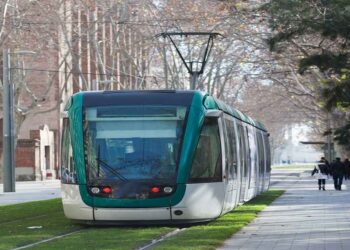The cross-border SNCF-DB rail alliance between France and Germany has been extended for 5 years following a new fleet of class 407 ICE 3 entering service between Frankfurt and Paris Gare de l’Est.
CEO of Deutsche Bahn, Rüdiger Grube and SNCF counterpart Guillaume Pepy have signed a commercial agreement renewing co-operation of cross-border high-speed rail for a further 5 years until 2020.
In addition, the ceremony, attended by German transport minister Alexander Dobrindt, celebrated the inaugural journey of the first class 407 ICE 3 entering service between Frankfurt and Paris.
According to SNCF, the new high-speed ICE 3 offers comfort and improved quality of service through the addition of screens displaying real time information for customers, lifts to improve access for wheelchair users, improved technical reliability and lower energy consumption.
The introduction of ICE 3 continues the DB-SNCF modernisation programme which began in 2012 with the arrival of TGV Euroduplex.
Nearly 12 million passengers travelled by ICE and TGV between the two countries since the launch of the operation of these lines via the joint venture Alleo in June 2007. Between 2008 and 2014, the number of passengers increased by more 44%.
Almost 12 million passengers travelled by ICE and TGV between France and Germany since the launch of the Alleo joint venture in 2007. Since then, passenger numbers increased by 44 percent between 2008 and 2014 and first half results in 2015 confirmed a 4 percent increase to approximately 900,000 passengers.
“This achievement has helped strengthen ties between our two countries, but also between our two companies,†said SNCF CEO Guillaume Pepy. “Our joint offering is now based on the latest high speed equipment that is, DB ICE 3 and TGV SNCF Euroduplex,†he added.
Rüdiger Grube added: “We are delighted that the new ICE 3, our most modern train now runs between France and Germany. Our three high speed connections (Paris-Frankfurt, Paris-Stuttgart-Munich and Frankfurt -Marseille) operated in cooperation, represent the heart of our transnational transport.â€
It is hoped services will continue to improve following the opening of the second section of the TGV Est between Paris and Strasbourg in 2016. Travelling time between the two cities will be reduced by 15 minutes to 3 hours 35 minutes, allowing the introduction of additional services.
































